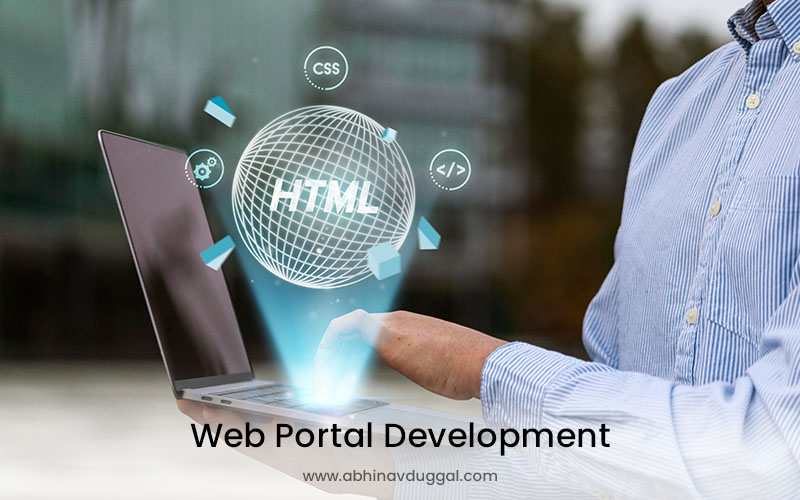Web Portal Development

Web Portal Development – Build Efficient and Interactive Platforms
Web portal development is a crucial aspect of modern businesses and organizations as it allows them to provide centralized access to information, services, and resources. A web portal is more than a regular website; it is an interactive platform that can be personalized according to user roles and preferences. By developing a custom web portal, organizations can streamline operations, improve user engagement, and enhance productivity. Web portals are widely used in corporate environments, educational institutions, government services, e-commerce platforms, and community networks.
What is Web Portal Development?
Web portal development is the process of creating a website or platform that acts as a gateway to tools, services, and information for users. Unlike standard websites, portals are designed for interaction, user authentication, and role-based access. They provide a centralized platform where users can log in, access personalized content, perform tasks, and communicate with other users. Web portal development ensures that the platform is secure, responsive, and scalable, making it suitable for long-term business growth.
Importance of Web Portal Development
Web portals are important because they act as a central hub where users can find all the resources they need in one place. They save time, reduce operational workload, and improve collaboration among teams. Organizations that invest in web portal development benefit from enhanced communication, better data management, and improved decision-making. A well-developed portal can also boost customer satisfaction, increase employee efficiency, and provide analytics that help in strategic planning.
Types of Web Portals
Corporate Portals
Corporate portals are designed for internal employees and provide access to company resources, HR tools, project management dashboards, and internal communications. These portals help improve collaboration, reduce manual processes, and ensure employees have access to relevant information efficiently.
Customer Portals
Customer portals are intended for clients and customers to provide them with access to services, reports, product information, order tracking, invoices, and support. They improve customer experience and allow businesses to maintain a strong relationship with their clients through personalized access.
Government Portals
Government portals offer citizens easy access to public services, information, and applications. They include features for tax filing, license applications, public notices, and other citizen services. These portals enhance transparency and reduce the need for physical visits to government offices.
E-Learning Portals
E-learning portals provide educational institutions and corporate organizations with platforms to deliver courses, training materials, assessments, and progress tracking. These portals allow learners to access resources anytime and anywhere, making education and training more accessible and flexible.
Community Portals
Community portals are platforms that connect people with shared interests. They often include discussion forums, resource sharing, events, and social interaction features. These portals help build communities, encourage collaboration, and provide a platform for users to communicate and share knowledge.
E-Commerce Portals
E-commerce portals allow businesses to sell products online, manage inventory, handle orders, and process secure payments. They offer a centralized platform for both customers and business owners, streamlining the entire online shopping experience.
Key Features of Web Portals
User Login and Role Management
Web portals provide secure login for users and allow role-based access to ensure that each user can access content and functionalities according to their responsibilities.
Dashboard and Analytics
A centralized dashboard provides users with quick access to relevant information, tasks, and insights. Analytics tools help track user activity, performance, and business metrics to support data-driven decisions.
Search Functionality
Effective search tools allow users to find information quickly. Advanced filters and categorization options improve the accuracy and speed of searches within the portal.
Messaging and Notifications
Portals include messaging systems and real-time notifications to keep users updated on tasks, alerts, and important announcements, facilitating seamless communication.
Document Management
Web portals provide secure document management where users can upload, store, and share files. Version control, permissions, and easy retrieval of documents improve productivity and data management.
API Integration
Portals can integrate with external tools, software, and APIs to enhance functionality without building every feature from scratch, enabling seamless connections between systems.
Mobile-Friendly Design
Modern portals are responsive, ensuring users can access them from desktops, tablets, and mobile devices. A mobile-friendly design enhances usability and accessibility for all users.
Security Features
Web portals include SSL encryption, secure authentication, and role-based access control to protect sensitive data. Regular backups and monitoring ensure the portal remains safe from unauthorized access and data loss.
Advantages of Web Portal Development
Centralized Information
Web portals provide a single platform where all data, tools, and resources are organized and accessible. This reduces confusion, saves time, and simplifies management.
Personalized User Experience
Portals display content based on user roles and preferences, enhancing engagement and making it easier for users to find what they need.
Cost and Time Efficiency
By automating workflows, web portals reduce manual processes, save operational costs, and allow teams to focus on strategic tasks instead of repetitive work.
Improved Collaboration
Portals support messaging, forums, file sharing, and collaborative tools, making it easier for teams and users to work together effectively.
Better Data Management
Portals store large amounts of information efficiently, provide reporting tools, and offer analytics to help businesses make informed decisions.
Web Portal Development Process
Requirement Analysis
This initial step involves understanding business objectives, user needs, and functional requirements. Clear documentation helps guide the entire development process.
Planning and Strategy
A roadmap is created to define timelines, technology choices, and project milestones. Planning ensures the project stays on schedule and meets objectives.
Design and UI/UX
Wireframes and prototypes are designed to create a user-friendly, responsive, and visually appealing interface that meets user expectations.
Development
Front-end and back-end development is done to implement features, integrate databases, and connect APIs. Developers focus on scalability, performance, and security.
Testing and Quality Assurance
The portal is tested for bugs, usability, speed, and security. Quality assurance ensures the portal functions correctly and provides a seamless experience.
Deployment
The portal is launched on live servers and made accessible to users. Performance monitoring and feedback collection help identify areas for improvement.
Maintenance and Support
Ongoing support and maintenance ensure the portal remains up-to-date, secure, and functional. Updates, feature enhancements, and troubleshooting are part of this phase.
Technologies Used in Web Portal Development
Frontend Technologies
HTML, CSS, JavaScript, Angular, React, and Vue.js are commonly used for creating responsive and interactive user interfaces.
Backend Technologies
PHP, Python, Node.js, and .NET are widely used for server-side development to handle business logic, databases, and integration.
Database Management
MySQL, SQL Server, and MongoDB are commonly used to store and manage portal data efficiently.
Cloud Hosting and Servers
AWS, Microsoft Azure, and Google Cloud provide scalable hosting solutions for web portals, ensuring availability and performance.
Security Tools
SSL certificates, encryption, authentication systems, and role-based access control protect user data and portal resources.
Content Management Systems
CMS platforms like WordPress, Joomla, and Drupal are sometimes integrated to manage content efficiently within the portal.
Industries That Benefit from Web Portals
E-Commerce
Portals help manage products, inventory, orders, and customer accounts efficiently.
Education
E-learning portals offer online courses, progress tracking, and assessment management for students and employees.
Healthcare
Patient portals manage appointments, medical records, billing, and telemedicine services.
Banking and Finance
Portals provide customers access to account information, online transactions, and loan management.
Government
Citizen portals deliver services, updates, and forms efficiently while ensuring transparency.
Corporate
Employee portals centralize HR management, internal communications, and project tracking.
Challenges in Web Portal Development
Challenges include ensuring security, maintaining scalability, handling complex functionality, and achieving smooth integration with external systems. Effective planning, experienced developers, and proper technology choices can overcome these challenges.
Tips for Successful Web Portal Development
Define clear requirements, hire experienced developers, prioritize responsive design, implement strong security, test thoroughly, and maintain the portal regularly for best results.
Conclusion
Web portal development is essential for businesses and organizations to centralize information, automate workflows, improve collaboration, and deliver personalized user experiences. By investing in professional web portal development, organizations can enhance productivity, secure data, and provide a scalable solution that grows with their needs. A well-developed portal is a strategic tool that connects users, organizes resources, and drives business success.
Why Customers Loves Us?

15+ Years Of Experience In Digital Industry
With over a decade of hands-on experience, we’ve helped businesses across industries thrive in the digital space. Our expertise ensures strategic, results-driven solutions tailored to your unique goals.

Guaranteed Results

Skilled Professional

Excellent Customer Support

Powerful Tools

Confidential Agreement









